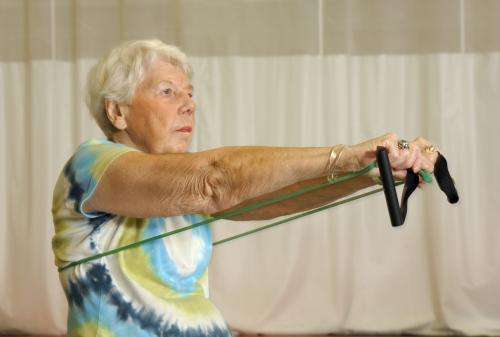Study: Intensive exercise training program for dementia patients improves care in clinical setting

(Medical Xpress)—A study by researchers at the University of Arizona Department of Surgery, published in the Journal of Alzheimer's Disease, showed that an innovative, customized exercise program applied to clinical practice substantially improved care for dementia patients.
The UA study combined high-intensity strength and functional exercises with specifically designed strategies for patients with dementia to promote exercise training in a hospital setting. The new exercise program was implemented in a hospital rehabilitation unit and compared with a usual-care rehabilitation program.
"Rehabilitation of basic functional tasks, such as the ability to rise from a chair or walking, is of utmost importance to reduce fall risk, prevent loss of independence and increase mobility-related quality of life in patients with dementia," said Michael Schwenk, lead author of the paper and a research associate with the UA Interdisciplinary Consortium on Advanced Motion Performanc, or iCAMP. "However, there has been a lack of evidence whether patients with dementia can benefit from more intensive rehabilitation exercise programs."
In addition to cognitive deficits, people with dementia experience declining basic motor performances, such as walking, during the course of the disease. Motor deficits worsen by the reduced physical activity and increase the fall rate in these patients, causing an additional disability burden. Based on motor and cognitive deficits, people with dementia have a threefold risk of falling compared with those without cognitive impairment, Schwenk said.
Results of the UA study showed that the higher-intensity, tailored exercise program greatly increased the benefits of functional performances in patients with dementia as compared with the traditional rehabilitation program. The patients who received the novel intensive training improved substantially in basic motor functions, such as lower-extremity muscle strength and postural balance, which are linked to the high fall risk in this population.
"Improvement in lower extremity strength was four times higher in the group that received the new training program compared to the group that received usual rehabilitation care only," said Schwenk. "Results indicate that medium to high training adherence can be achieved in the majority of geriatric inpatients despite cognitive impairment and acute functional impairment."
Several studies have identified cognitive impairment as a negative predictor for functional rehabilitation outcomes and that memory loss, language impairments or lack of motivation may be barriers for effective rehabilitation. Schwenk said geriatricians and therapists struggle with which type of exercise and what level of intensity is appropriate for these patients, and that little guidance is available as to which exercise program is the most suitable. Specific exercise programs incorporating strategies to promote exercise training in patients with dementia have not been adequately developed, he said.
"The UA study provides important insight as to how geriatric rehabilitation exercise programs in patients with dementia can be adjusted and rendered more effective," Schwenk said. "Current findings may help to establish specifically designed rehabilitation exercise programs for patients with dementia and may provide guidance to clinicians as to which rehabilitation protocols are the most effective."

















